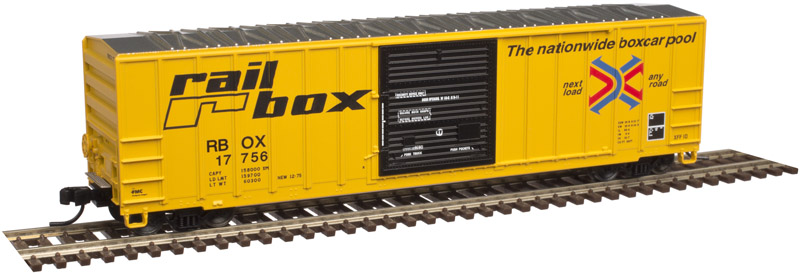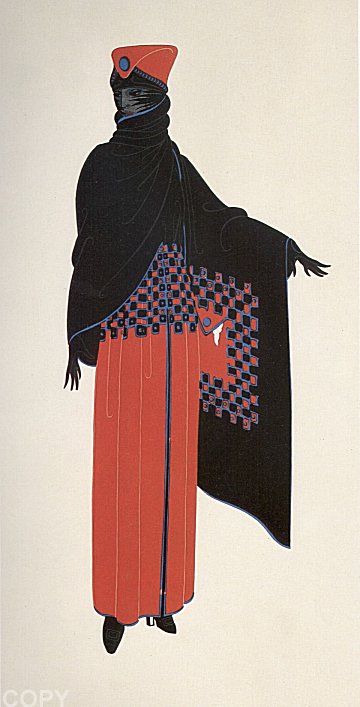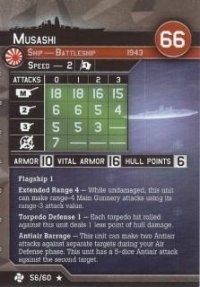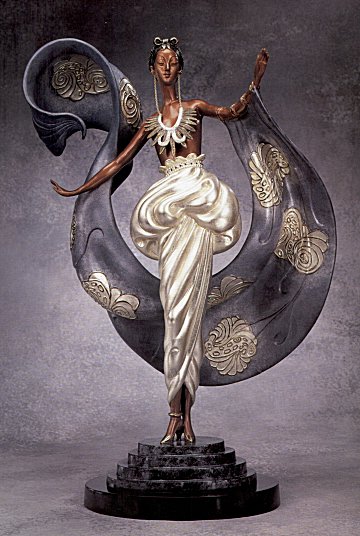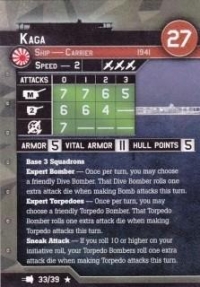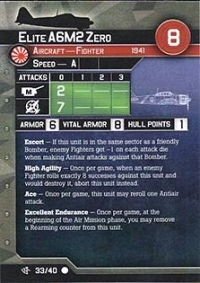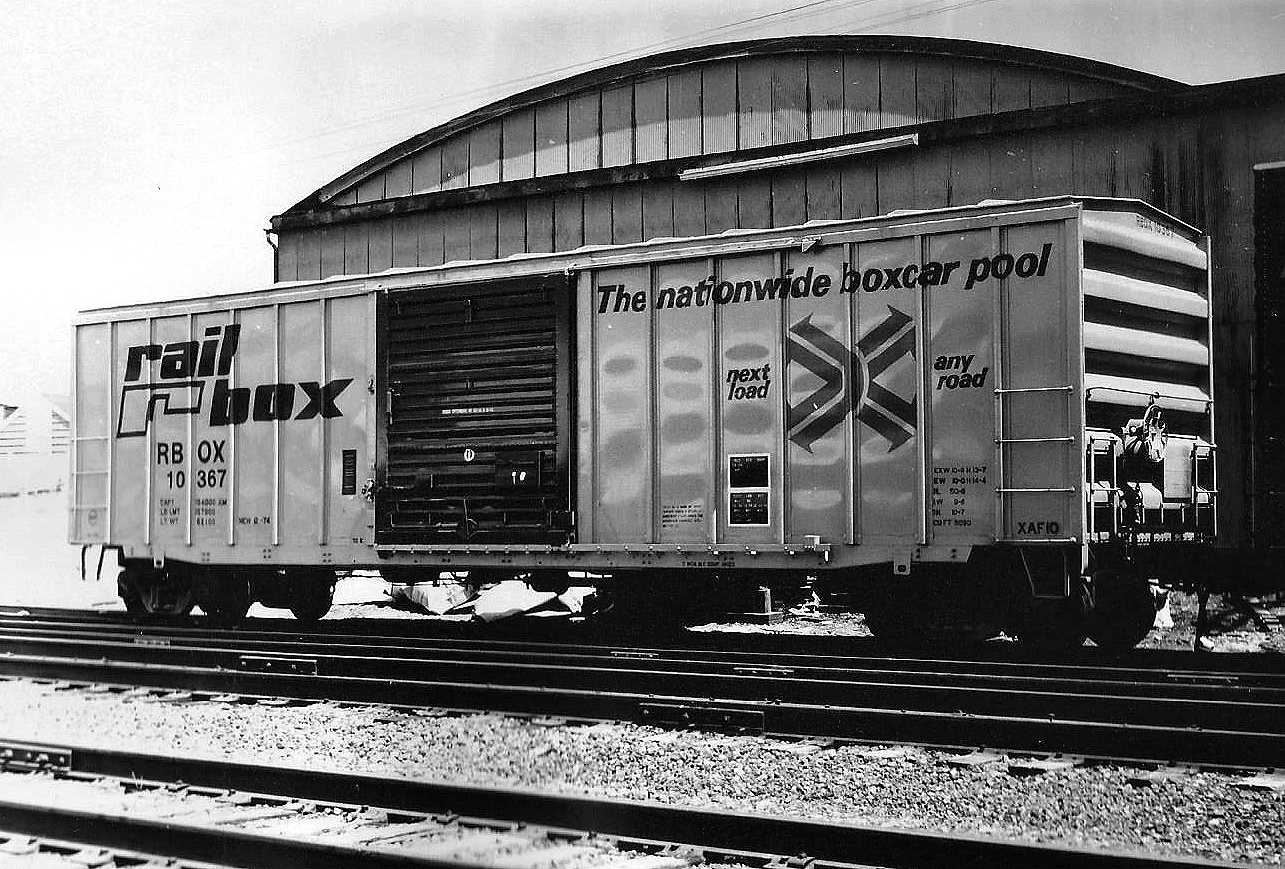Model Information: This model was introduced in 2016. It is part of Atlas' "Master" line of N Scale products. These Atlas N scale Plate B Boxcars feature early and late body styles with single sliding doors, body mounted couplers, and X-Panel roofs.
Prototype History: In the 1970's with the growth of the Per Diem business model, FMC produced a series of 50 foot box cars in different configurations. The single-sliding-door configuration is one of the best known and used widely by many different railroads. These cars were produced using the Gunderson metal works which FMC had acquired in 1965. In late 1975, FMC began producing a 5,077-cubic-foot Plate B box car for IPD and Railbox service. FMC's 5077s have seven panels to either side of the 10-foot door, an X-panel roof, and non-terminating ends that are slightly different from those used on FMC's earlier cars. Note how the sidesill is notched all the way back to the bolsters, a key feature of FMC's mature design.
The main difference between the 5077 cu. ft cars built by FMC vs the 5277-5347 cu. ft cars built by the same manufacturers is the overall height of the car, the smaller 5077 cars were Plate B while the larger 5277-5347 cars were Plate C. Over 4,300 cars were produced from 1975-1979 by FMC's Portland, Oregon plant. The cars were delivered in numerous colorful shortline paint schemes, as well as the nationwide car pool fleet of Railbox. Many secondhand cars were later seen in Class 1 railroads and large leasing company fleets under additional shortline reporting marks.
The main difference between the 5077 cu. ft cars built by FMC vs the 5277-5347 cu. ft cars built by the same manufacturers is the overall height of the car, the smaller 5077 cars were Plate B while the larger 5277-5347 cars were Plate C. Over 4,300 cars were produced from 1975-1979 by FMC's Portland, Oregon plant. The cars were delivered in numerous colorful shortline paint schemes, as well as the nationwide car pool fleet of Railbox. Many secondhand cars were later seen in Class 1 railroads and large leasing company fleets under additional shortline reporting marks.
Road Name History: RailBox Company (reporting marks ABOX, RBOX, TBOX, FBOX), founded in 1974, was created to address a boxcar shortage in the United States in the 1970s.
The concept behind RailBox, as evidenced by their slogan "Next Load, Any Road!" was that since Railbox was owned by many of the railroads as a privately owned cooperative, their boxcars were not subject to load/empty rules. Railbox cars could be assigned for service anywhere in Canada, Mexico and the United States on lines where an AAR Plate-C loading gauge is permitted. Railbox purchased boxcars from many Manufacturers including American Car and Foundry (ACF), Farmers Machinery Company (FMC), and Pullman-Standard (P-S).
Under the ICC car routing rules in effect at the time, cars owned by operating companies were supposed to be routed back to their owning road as soon as possible or the host road would have to pay demurrage(car storage and handling) charges. This was the cause a shortage of available cars and not an actual shortage of boxcars numerically. As empty cars were required to be routed back to their home railroad instead of being loaded and routed to another destination.
RailBox cars are all boxcars and are painted yellow with black doors. RailBox cars had a bold graphic side logo, which was a stylized X made of red and blue intertwined arrows to symbolize free flow. During the 1970s many railroads had old fleets of railcars. Due to the poor financial state of many railroads these cars were dirty and grimy. Railbox cars stood out with their bright yellow paint and large logos. The company's car reporting marks, as noted above, ended in the letter "X". Under FRA designation reporting marks ending in "X" are assigned to private owner cars.
As of 2015, many RailBox cars are still in service. The rise of intermodal containerized freight (which began in the late 1980s and early 1990s) has reduced the demand for full carload boxcar service. Also deregulation in the 1980s eliminated the legacy car routing rules, reaching its peak with the elimination of the Interstate Commerce Commission in 1995.
RailBox (and the similar Railgon Company) are currently subsidiaries of TTX Company.
From Wikipedia
The concept behind RailBox, as evidenced by their slogan "Next Load, Any Road!" was that since Railbox was owned by many of the railroads as a privately owned cooperative, their boxcars were not subject to load/empty rules. Railbox cars could be assigned for service anywhere in Canada, Mexico and the United States on lines where an AAR Plate-C loading gauge is permitted. Railbox purchased boxcars from many Manufacturers including American Car and Foundry (ACF), Farmers Machinery Company (FMC), and Pullman-Standard (P-S).
Under the ICC car routing rules in effect at the time, cars owned by operating companies were supposed to be routed back to their owning road as soon as possible or the host road would have to pay demurrage(car storage and handling) charges. This was the cause a shortage of available cars and not an actual shortage of boxcars numerically. As empty cars were required to be routed back to their home railroad instead of being loaded and routed to another destination.
RailBox cars are all boxcars and are painted yellow with black doors. RailBox cars had a bold graphic side logo, which was a stylized X made of red and blue intertwined arrows to symbolize free flow. During the 1970s many railroads had old fleets of railcars. Due to the poor financial state of many railroads these cars were dirty and grimy. Railbox cars stood out with their bright yellow paint and large logos. The company's car reporting marks, as noted above, ended in the letter "X". Under FRA designation reporting marks ending in "X" are assigned to private owner cars.
As of 2015, many RailBox cars are still in service. The rise of intermodal containerized freight (which began in the late 1980s and early 1990s) has reduced the demand for full carload boxcar service. Also deregulation in the 1980s eliminated the legacy car routing rules, reaching its peak with the elimination of the Interstate Commerce Commission in 1995.
RailBox (and the similar Railgon Company) are currently subsidiaries of TTX Company.
From Wikipedia
Brand/Importer Information: In 1924 Stephan Schaffan, Sr. founded the Atlas Tool Company in Newark, New Jersey. In 1933 his son, Stephan Schaffan, Jr., came to work for his father at the age of sixteen. Steve Jr. built model airplanes as a hobby and frequented a local hobby shop. Being an enterprising young man, he would often ask the owner if there was anything he could do to earn some extra spending money. Tired of listening to his requests, the hobby-store owner threw some model railroad track parts his way and said, "Here, see if you can improve on this".
In those days, railroad modelers had to assemble and build everything from scratch. Steve Jr. created a "switch kit" which sold so well, that the entire family worked on them in the basement at night, while doing business as usual in the machine shop during the day.
Subsequently, Steve Jr. engineered the stapling of rail to fiber track, along with inventing the first practical rail joiner and pre-assembled turnouts and flexible track. All of these products, and more, helped to popularize model railroading and assisted in the creation of a mass-market hobby. The budding entrepreneur quickly outgrew the limitations of a basement and small garage operation. Realizing they could actually make a living selling track and related products, Steve and his father had the first factory built in Hillside, New Jersey at 413 Florence Avenue in 1947. On September 30, 1949, the Atlas Tool Company was officially incorporated as a New Jersey company.
In 1985, Steve was honored posthumously for his inventions by the Model Railroad Industry Association and was inducted into the Model Railroad Industry Hall of Fame in Baltimore, Maryland. In addition, Steve was nominated and entered into the National Model Railroad Association Pioneers of Model Railroading in 1995.
In the early 1990s, the Atlas Tool Company changed its name to Atlas Model Railroad Company, Inc.
In those days, railroad modelers had to assemble and build everything from scratch. Steve Jr. created a "switch kit" which sold so well, that the entire family worked on them in the basement at night, while doing business as usual in the machine shop during the day.
Subsequently, Steve Jr. engineered the stapling of rail to fiber track, along with inventing the first practical rail joiner and pre-assembled turnouts and flexible track. All of these products, and more, helped to popularize model railroading and assisted in the creation of a mass-market hobby. The budding entrepreneur quickly outgrew the limitations of a basement and small garage operation. Realizing they could actually make a living selling track and related products, Steve and his father had the first factory built in Hillside, New Jersey at 413 Florence Avenue in 1947. On September 30, 1949, the Atlas Tool Company was officially incorporated as a New Jersey company.
In 1985, Steve was honored posthumously for his inventions by the Model Railroad Industry Association and was inducted into the Model Railroad Industry Hall of Fame in Baltimore, Maryland. In addition, Steve was nominated and entered into the National Model Railroad Association Pioneers of Model Railroading in 1995.
In the early 1990s, the Atlas Tool Company changed its name to Atlas Model Railroad Company, Inc.
Item created by: nscalemodeler160 on 2016-04-22 01:48:49. Last edited by CNW400 on 2020-06-02 16:42:20
If you see errors or missing data in this entry, please feel free to log in and edit it. Anyone with a Gmail account can log in instantly.
If you see errors or missing data in this entry, please feel free to log in and edit it. Anyone with a Gmail account can log in instantly.


